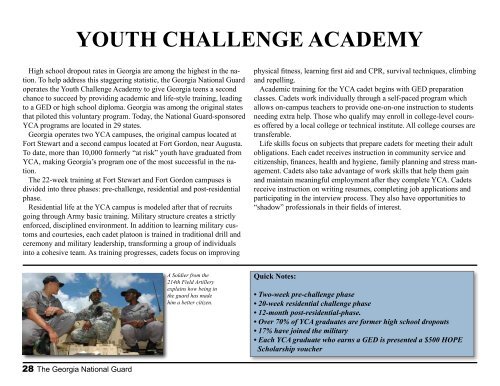2009 Annual Report Georgia Department of Defense
2009 Annual Report Georgia Department of Defense
2009 Annual Report Georgia Department of Defense
You also want an ePaper? Increase the reach of your titles
YUMPU automatically turns print PDFs into web optimized ePapers that Google loves.
YOUTH CHALLENGE ACADEMY<br />
High school dropout rates in <strong>Georgia</strong> are among the highest in the nation.<br />
To help address this staggering statistic, the <strong>Georgia</strong> National Guard<br />
operates the Youth Challenge Academy to give <strong>Georgia</strong> teens a second<br />
chance to succeed by providing academic and life-style training, leading<br />
to a GED or high school diploma. <strong>Georgia</strong> was among the original states<br />
that piloted this voluntary program. Today, the National Guard-sponsored<br />
YCA programs are located in 29 states.<br />
<strong>Georgia</strong> operates two YCA campuses, the original campus located at<br />
Fort Stewart and a second campus located at Fort Gordon, near Augusta.<br />
To date, more than 10,000 formerly “at risk” youth have graduated from<br />
YCA, making <strong>Georgia</strong>’s program one <strong>of</strong> the most successful in the nation.<br />
The 22-week training at Fort Stewart and Fort Gordon campuses is<br />
divided into three phases: pre-challenge, residential and post-residential<br />
phase.<br />
Residential life at the YCA campus is modeled after that <strong>of</strong> recruits<br />
going through Army basic training. Military structure creates a strictly<br />
enforced, disciplined environment. In addition to learning military customs<br />
and courtesies, each cadet platoon is trained in traditional drill and<br />
ceremony and military leadership, transforming a group <strong>of</strong> individuals<br />
into a cohesive team. As training progresses, cadets focus on improving<br />
28 The <strong>Georgia</strong> National Guard<br />
A Soldier from the<br />
214th Field Artillery<br />
explains how being in<br />
the guard has made<br />
him a better citizen.<br />
physical fitness, learning first aid and CPR, survival techniques, climbing<br />
and repelling.<br />
Academic training for the YCA cadet begins with GED preparation<br />
classes. Cadets work individually through a self-paced program which<br />
allows on-campus teachers to provide one-on-one instruction to students<br />
needing extra help. Those who qualify may enroll in college-level courses<br />
<strong>of</strong>fered by a local college or technical institute. All college courses are<br />
transferable.<br />
Life skills focus on subjects that prepare cadets for meeting their adult<br />
obligations. Each cadet receives instruction in community service and<br />
citizenship, finances, health and hygiene, family planning and stress management.<br />
Cadets also take advantage <strong>of</strong> work skills that help them gain<br />
and maintain meaningful employment after they complete YCA. Cadets<br />
receive instruction on writing resumes, completing job applications and<br />
participating in the interview process. They also have opportunities to<br />
“shadow” pr<strong>of</strong>essionals in their fields <strong>of</strong> interest.<br />
Quick Notes:<br />
• Two-week pre-challenge phase<br />
• 20-week residential challenge phase<br />
• 12-month post-residential-phase.<br />
• Over 70% <strong>of</strong> YCA graduates are former high school dropouts<br />
• 17% have joined the military<br />
• Each YCA graduate who earns a GED is presented a $500 HOPE<br />
Scholarship voucher


